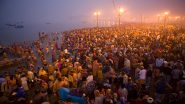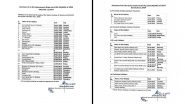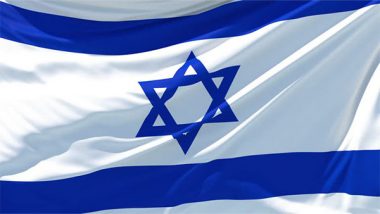Jerusalem [Israel], December 29 (ANI/TPS): As the fragile ceasefire between Israel and Hezbollah holds, the Israeli Defence Forces (IDF) keep uncovering a significant cache of weapons hidden within civilian infrastructure in southern Lebanon. These discoveries underscore ongoing concerns about Hezbollah's military buildup and its exploitation of civilian areas for terrorist purposes, regardless of the ceasefire conditions.
"Those aren't villages with some military infrastructure, this is a military base disguised as a civilian area," Sarit Zahavi, president of the Alma Research Center, commented to The Press Service of Israel.
Also Read | Earthquake in UAE: Light Quake of Magnitude 2.2 on Richter Scale Hits Falaj Al Mualla.
Among the discoveries made on Friday was a truck mounted with 40 rocket launcher barrels, located by the IDF's 226th Brigade near Naqoura, a village close to the Israeli border. Additional military equipment, including explosives, RPG missiles, and rifles, was found concealed inside a pharmacy, while underground facilities held "Burkan" missiles and other weapons ready for use.
Also on Friday, the IDF carried out an airstrike targeting Hezbollah's Unit 4400, which oversees weapons smuggling from Iran through Syria into Lebanon. According to the IDF, these actions aim to disrupt Hezbollah's rearmament efforts following the war.
Zahavi, who resides in northern Israel, stressed the ongoing tension among Israeli communities near the border. She emphasized that the IDF's findings illustrate the extent of Hezbollah's military buildup.
Hezbollah appears to be preparing for the next phase of conflict. Zahavi noted that the group is already coordinating reconstruction efforts through its organization, "Jihad al-Bina".
"They've set up a command center in southern Lebanon to map damages, assist residents, and rebuild infrastructure," she explained.
These activities raise questions about how Hezbollah might use the current lull in hostilities to strengthen its military capabilities. The discoveries come amid growing friction between the IDF and the United Nations Interim Force in Lebanon (UNIFIL). In a statement on December 26, UNIFIL urged both sides to respect the ceasefire agreement and adhere to UN Security Council Resolution 1701. (ANI/TPS)
"Any actions that risk the fragile cessation of hostilities must cease," the statement read, highlighting concerns over IDF operations in residential areas. UNIFIL emphasized its role in ensuring that the area south of the Litani River remains free of armed personnel and weapons other than those of the Lebanese government and the mission itself.
However, Zahavi criticized UNIFIL's effectiveness, arguing it has done little to counter Hezbollah's efforts, leaving a significant portion of southern Lebanon unchecked.
"UNIFIL has failed to identify and dismantle Hezbollah's military infrastructure, much of which was built in open areas under their watch," Zahavi said. She described Hezbollah's systematic embedding of weapons in civilian areas as a deliberate strategy to exploit both UNIFIL and international law.
The IDF dismissed the UNIFIL criticism, asserting in the comment for TPS-IL that its operations are in line with the ceasefire understandings.
"The IDF operates in accordance with the agreements and understandings between Israel and Lebanon, maintaining the terms of the ceasefire. The IDF remains deployed in southern Lebanon and will act to eliminate any threat to the State of Israel and its citizens," the IDF stated. It reiterated the commitment to protect Israeli citizens and ensure that southern Lebanon does not become a launching pad for future attacks.
As the ceasefire's one-month mark passes, uncertainty looms over what comes next. While the IDF continues to uncover and dismantle Hezbollah's infrastructure, Zahavi warned that the current peace is tenuous at best.
"There's a deep fear here in North Israel about what will happen once the ceasefire ends," she said, pointing to the unresolved tensions and the limited trust in international mechanisms.
Under the terms of a two-month ceasefire that went into effect on November 27, Hezbollah is supposed to withdraw its armed presence from areas of southern Lebanon south of the Litani River.
Israeli forces will also withdraw from southern Lebanon in stages. The Lebanese Armed Forces are to be deployed there first, including along the 120 km border with Israel, with monitors from the United Nations Interim Force in Lebanon.
According to United Nations Security Council Resolution 1701, which ended the 2006 Second Lebanon War, Hezbollah is forbidden from operating in southern Lebanon south of the Litani River. (ANI/TPS)
(This is an unedited and auto-generated story from Syndicated News feed, LatestLY Staff may not have modified or edited the content body)













 Quickly
Quickly

















